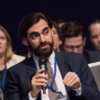Paul Fehlinger: Difference between revisions
| (23 intermediate revisions by 2 users not shown) | |||
| Line 2: | Line 2: | ||
|portrait = Paul Fehlinger Portrait (1).png | |portrait = Paul Fehlinger Portrait (1).png | ||
|caricature = PaulFehlinger-Caricature.jpg | |caricature = PaulFehlinger-Caricature.jpg | ||
|affiliation= Internet & Jurisdiction | |affiliation= Internet & Jurisdiction Policy Network | ||
|born = Germany | |born = Germany | ||
|country = France | |country = France | ||
| Line 9: | Line 9: | ||
|twitter = paulfehlinger | |twitter = paulfehlinger | ||
|facebook = | |facebook = | ||
|linkedin = | |linkedin = http://fr.linkedin.com/in/paulfehlinger/en | ||
|userbox = | |userbox = | ||
}} | }} | ||
'''Paul Fehlinger''' is the | '''Paul Fehlinger''' is the Co-Founder and Deputy Executive Director of the [https://www.internetjurisdiction.net Internet & Jurisdiction Policy Network]<ref name="linkedin">[http://fr.linkedin.com/in/paulfehlinger/en LinkedIn] From LinkedIn.com. Retrieved 23 February 2015. </ref>. The multistakeholder organization engages over 300 key entities around the world from governments, the world’s largest Internet companies, civil society, and international organizations to address the new cross-border legal challenges of the digital 21st century. | ||
= | His comments on the future of the global internet and the digital economy have been featured, among others, by The Economist<ref>http://www.economist.com/news/international/21709531-left-unchecked-growing-maze-barriers-internet-will-damage-economies-and</ref>, New York Times<ref>https://www.nytimes.com/2019/04/12/technology/tech-regulation-too-fast.html?rref=collection%2Fbyline%2Fjamie-condliffe</ref>, Fortune<ref>http://fortune.com/2016/04/08/internet-jurisdiction-trade/</ref>, Slate<ref>http://www.slate.com/articles/technology/future_tense.html</ref>, POLITICO<ref>https://www.politico.eu/article/google-facebook-alphabet-twitter-us-congress-senate-house-of-representatives-digital-advertising/</ref>, Euronews<ref>https://www.euronews.com/2019/05/15/macron-and-ardern-seek-pledge-to-eliminate-violent-content-online</ref>, the Swiss Neue Züricher Zeitung<ref>http://www.nzz.ch/aktuell/startseite/das-ende-des-internets-1.18239023</ref>, the German Die Zeit<ref>http://www.zeit.de/digital/internet/2014-02/regierungen-treiben-internet-fragmentierung-voran</ref>, the Dutch NRC [https://www.nrc.nl/nieuws/2018/09/03/in-elk-land-krijg-je-een-ander-internet-a1615108 Handelsblad] Internet Policy Review<ref>http://policyreview.info/articles/news/cyberspace-fragmentation-internet-governance-debate-beyond-infrastructure/266</ref>, Deutschlandfunk<ref>http://www.deutschlandfunk.de/internet-manuskript-metropolis-und-moloch.740.de.html?dram:article_id=289130</ref>, and by the Council on Foreign Relations<ref>http://blogs.cfr.org/cyber/2016/05/09/a-legal-arms-race-threatens-the-future-of-the-internet/</ref>, as well as by the Freedom Online Coalition<ref>https://www.freedomonlinecoalition.com/how-we-work/working-groups/working-group-2/wg2-rule-of-law-blog-series-2/</ref> Oxford University Press, or Mary Meeker's Internet [https://techcrunch.com/2019/06/11/internet-trends-report-2019/ Trends Report] . He is a regular speaker at international fora, including in the past at the United Nations<ref>https://www.youtube.com/watch?v=qQibakQP_TQ</ref>, OECD<ref>http://www.internetjurisdiction.net/oecd-cdep-2014/ , http://www.internetjurisdiction.net/events/oecd-forum-idea-factory-2014/</ref>, European Commission, Council of Europe<ref>http://www.internetjurisdiction.net/events/coe_net_transparency_2013/</ref>, the G7 process<ref>http://www.internetjurisdiction.net/event/i-j-presents-work-and-gijc-2016-outcomes-to-g7-cyber-group</ref>, or the WTO<ref>https://www.wto.org/english/forums_e/public_forum16_e/wrksesions_e/session81_e.htm</ref>. | ||
Politico wrote "Paul Fehlinger isn’t a household name like Mark Zuckerberg. But the Paris-based policy wonk has an ambition that’s just as big and far-reaching as the Facebook chief’s digital empire: fixing the internet."<ref>https://www.politico.eu/article/internet-governance-ottawa-regulation-balkanization-splinternet-global-jurisdiction-policy-network/</ref> | |||
Paul | |||
Paul was appointed as a member of the Advisory Network of the Global Commission on Internet Governance<ref>https://www.ourinternet.org/#research_advisers</ref>, as well as of the Working Group on Rule of Law of the Freedom Online Coalition<ref>https://www.freedomonlinecoalition.com/how-we-work/working-groups/working-group-2/</ref>. He was also a participant in the Council of Europe's Committee of Experts on Cross-border Flow of Internet Traffic and Internet Freedom<ref>http://www.coe.int/t/dghl/standardsetting/media/MSI-INT/MSI-INT%20List%20Participants%202nd%20meeting.pdf</ref>, and the World Economic Forum’s Future of the Internet Initiative. Recognising the contribution of the Internet & Jurisdiction Policy Network to global governance, the organization was one of only 40 worldwide initiatives showcased at the Paris Peace Forum, gathering over 80 heads of government and international organisations, with a special [https://www.internetjurisdiction.net/event/internet-jurisdiction-policy-network-selected-to-be-showcased-at-paris-peace-forum session]. | |||
Paul holds a Masters of International Relations from Sciences Po Paris and was a scholar of the German National Merit Foundation (Studienstiftung). He was also a visiting researcher at the Max Planck Institute for the Study of Societies and holds a BA in European Studies from Maastricht University. He is fluent in English, German and French. | |||
== | ==Internet & Jurisdiction Policy Network== | ||
The Internet & Jurisdiction Policy Network is the multistakeholder organization addressing the tension between the cross-border Internet and national jurisdictions. Its Secretariat facilitates a global policy process engaging over 300 key entities from governments, the world’s largest internet companies, technical operators, civil society groups, academia and international organizations from over 50 countries. Stakeholders work in currently three Programs (Data & Jurisdiction, Content & Jurisdiction and Domains & Jurisdiction) to jointly develop policy standards and operational solutions to pressing legal challenges at the intersection of the global digital economy, human rights and security. The organization is also the home of the I&J Retrospect Database tracking global trends, and the Internet & Jurisdiction Status Reports. | |||
The regular Global Conferences of the Internet & Jurisdiction Policy Network are institutionally supported by the Council of Europe, European Commission, ICANN, OECD, United Nations ECLAC, and UNESCO. Partner countries include France (2016), Canada (2018) and Germany (2019). The work of the organization has been presented to and recognized by key international processes, including the UN Internet Governance Forum, G7, G20 or the Paris Peace Forum, and covered in top media outlets such as The Economist, Washington Post, Financial Times, Politico or Fortune. The organization is financially supported by a unique coalition of over 20 governments, companies and organizations. | |||
==References== | ==References== | ||
{{reflist}} | {{reflist}} | ||
[[Category: | [[Category:Academia]] | ||
[[Category:NGO Worker]] | |||
Latest revision as of 19:06, 4 June 2021
 |
 |
| Affiliation: | Internet & Jurisdiction Policy Network |
| Country: | France |
| LinkedIn: | |
| Twitter: |
Paul Fehlinger is the Co-Founder and Deputy Executive Director of the Internet & Jurisdiction Policy Network[1]. The multistakeholder organization engages over 300 key entities around the world from governments, the world’s largest Internet companies, civil society, and international organizations to address the new cross-border legal challenges of the digital 21st century.
His comments on the future of the global internet and the digital economy have been featured, among others, by The Economist[2], New York Times[3], Fortune[4], Slate[5], POLITICO[6], Euronews[7], the Swiss Neue Züricher Zeitung[8], the German Die Zeit[9], the Dutch NRC Handelsblad Internet Policy Review[10], Deutschlandfunk[11], and by the Council on Foreign Relations[12], as well as by the Freedom Online Coalition[13] Oxford University Press, or Mary Meeker's Internet Trends Report . He is a regular speaker at international fora, including in the past at the United Nations[14], OECD[15], European Commission, Council of Europe[16], the G7 process[17], or the WTO[18].
Politico wrote "Paul Fehlinger isn’t a household name like Mark Zuckerberg. But the Paris-based policy wonk has an ambition that’s just as big and far-reaching as the Facebook chief’s digital empire: fixing the internet."[19]
Paul was appointed as a member of the Advisory Network of the Global Commission on Internet Governance[20], as well as of the Working Group on Rule of Law of the Freedom Online Coalition[21]. He was also a participant in the Council of Europe's Committee of Experts on Cross-border Flow of Internet Traffic and Internet Freedom[22], and the World Economic Forum’s Future of the Internet Initiative. Recognising the contribution of the Internet & Jurisdiction Policy Network to global governance, the organization was one of only 40 worldwide initiatives showcased at the Paris Peace Forum, gathering over 80 heads of government and international organisations, with a special session.
Paul holds a Masters of International Relations from Sciences Po Paris and was a scholar of the German National Merit Foundation (Studienstiftung). He was also a visiting researcher at the Max Planck Institute for the Study of Societies and holds a BA in European Studies from Maastricht University. He is fluent in English, German and French.
Internet & Jurisdiction Policy Network
The Internet & Jurisdiction Policy Network is the multistakeholder organization addressing the tension between the cross-border Internet and national jurisdictions. Its Secretariat facilitates a global policy process engaging over 300 key entities from governments, the world’s largest internet companies, technical operators, civil society groups, academia and international organizations from over 50 countries. Stakeholders work in currently three Programs (Data & Jurisdiction, Content & Jurisdiction and Domains & Jurisdiction) to jointly develop policy standards and operational solutions to pressing legal challenges at the intersection of the global digital economy, human rights and security. The organization is also the home of the I&J Retrospect Database tracking global trends, and the Internet & Jurisdiction Status Reports.
The regular Global Conferences of the Internet & Jurisdiction Policy Network are institutionally supported by the Council of Europe, European Commission, ICANN, OECD, United Nations ECLAC, and UNESCO. Partner countries include France (2016), Canada (2018) and Germany (2019). The work of the organization has been presented to and recognized by key international processes, including the UN Internet Governance Forum, G7, G20 or the Paris Peace Forum, and covered in top media outlets such as The Economist, Washington Post, Financial Times, Politico or Fortune. The organization is financially supported by a unique coalition of over 20 governments, companies and organizations.
References
- ↑ LinkedIn From LinkedIn.com. Retrieved 23 February 2015.
- ↑ http://www.economist.com/news/international/21709531-left-unchecked-growing-maze-barriers-internet-will-damage-economies-and
- ↑ https://www.nytimes.com/2019/04/12/technology/tech-regulation-too-fast.html?rref=collection%2Fbyline%2Fjamie-condliffe
- ↑ http://fortune.com/2016/04/08/internet-jurisdiction-trade/
- ↑ http://www.slate.com/articles/technology/future_tense.html
- ↑ https://www.politico.eu/article/google-facebook-alphabet-twitter-us-congress-senate-house-of-representatives-digital-advertising/
- ↑ https://www.euronews.com/2019/05/15/macron-and-ardern-seek-pledge-to-eliminate-violent-content-online
- ↑ http://www.nzz.ch/aktuell/startseite/das-ende-des-internets-1.18239023
- ↑ http://www.zeit.de/digital/internet/2014-02/regierungen-treiben-internet-fragmentierung-voran
- ↑ http://policyreview.info/articles/news/cyberspace-fragmentation-internet-governance-debate-beyond-infrastructure/266
- ↑ http://www.deutschlandfunk.de/internet-manuskript-metropolis-und-moloch.740.de.html?dram:article_id=289130
- ↑ http://blogs.cfr.org/cyber/2016/05/09/a-legal-arms-race-threatens-the-future-of-the-internet/
- ↑ https://www.freedomonlinecoalition.com/how-we-work/working-groups/working-group-2/wg2-rule-of-law-blog-series-2/
- ↑ https://www.youtube.com/watch?v=qQibakQP_TQ
- ↑ http://www.internetjurisdiction.net/oecd-cdep-2014/ , http://www.internetjurisdiction.net/events/oecd-forum-idea-factory-2014/
- ↑ http://www.internetjurisdiction.net/events/coe_net_transparency_2013/
- ↑ http://www.internetjurisdiction.net/event/i-j-presents-work-and-gijc-2016-outcomes-to-g7-cyber-group
- ↑ https://www.wto.org/english/forums_e/public_forum16_e/wrksesions_e/session81_e.htm
- ↑ https://www.politico.eu/article/internet-governance-ottawa-regulation-balkanization-splinternet-global-jurisdiction-policy-network/
- ↑ https://www.ourinternet.org/#research_advisers
- ↑ https://www.freedomonlinecoalition.com/how-we-work/working-groups/working-group-2/
- ↑ http://www.coe.int/t/dghl/standardsetting/media/MSI-INT/MSI-INT%20List%20Participants%202nd%20meeting.pdf
